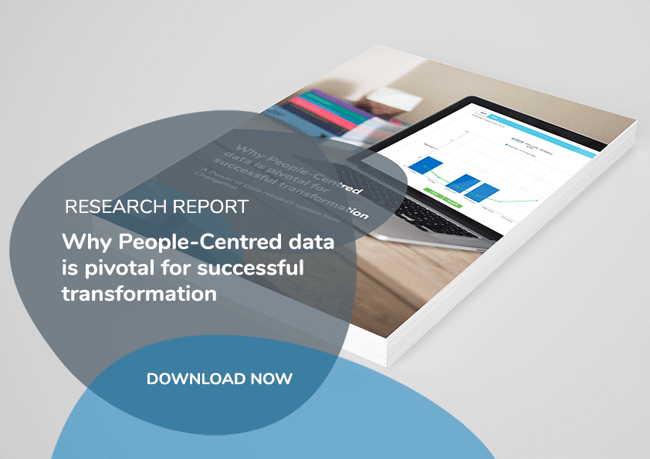As we get back to our desks after a well-earned break it seems like an ideal time to take a look forward into 2020 – and identify some of the Change Management and Adoption trends that we believe will shape the year ahead.

There are 4 key trends that we see as having a significant impact in the coming year:
-
-
- Digital transformation is becoming part of “business as usual”. And Change Management needs to be agile enough to support it
- You need access to real-time, predictive people data – and digital Change Management platforms – to manage the impact
- Monitoring employee experience will be key. Including priorities around mindfulness, resilience and creating cohesive culture
- Effective Change Management will drive technology adoption and time to value
- Digital transformation is becoming part of “business as usual”. And Change Management needs to be agile enough to support it
-
Here we take a look at each in more detail.
-
Digital transformation becomes increasingly ‘business as usual’
There is probably very little argument that digital transformation – driven by relentless technology innovation - is forcing businesses to continually adapt and change the way they work.
The initial surge in transformation is seeing organizations apply digital technology to almost every part of the value chain – whether it be Maersk who are utilizing blockchain technology to overcome the lack of transparency and efficiency in international supply chains, or Aeroflot who are using digital systems to improve everything from passenger booking, through operations to customer care.
But what is going to happen after this initial digital thrust in the business? We think that digital transformation will simply become an ongoing way of working. So, it will no longer be confined to one-off extreme transformation programs, but increasingly more about smaller projects tackling burning issues in the organization. As part of business as usual. And, as part of this shift, every organizational function will need to work on digital transformation on an ongoing basis. According to Gartner this is happening now with 62% of CEOs surveyed saying they have a range of management initiatives and digital transformation programs underway across their business.
The challenge for Change Management in all of this? Creating the capability to support the organization effectively - with the ability to get started somewhere and keep moving and iterating from there. All of which means that your approach to Change Management has to become increasingly agile and scalable. And, in order to get your teams to adopt these continual technology changes, it is essential that you get the right change tools out to leaders and teams across the business. And teach them how to use them effectively.
Listen as Audra Proctor, CEO of Changefirst explains why agile organizations need agile Change Management
-
Real-time Change Management data is central to business transformation and future positioning
Like most change, success rests in understanding the personal rather than the generic impact that change is having on the organization.
This is an area that we continue to focus on strongly with our clients. We also believe passionately, as HBR have consistently championed, that data can do for Change Management what it did for marketing. Where the use of real-time, predictive data has transformed the effectiveness of the marketing function.
From a Change Management perspective, we see a number of data sub-trends emerging including:
- leaders who want to understand the readiness of users and the impact on users in real-time. They don't want anecdotal feedback but real data. This means that change leaders now need to find ways to pulse survey users on an ongoing and continuous basis
- which means that organizations need to create the platforms and mechanisms for more people data to be processed and analyzed. All in an increasingly automated way which is designed for productivity and efficiency, and to drive the real-time insights that the organization needs
- augmented and predictive analytics will be key to helping organizations unlock value in the data – and quickly validate decisions and forecast next steps
- dashboard presentation of Change Management data is now increasingly essential to leaders, for transparency and traceability
-
The ‘employee experience’ will increasingly be prioritized by organizations
Perhaps in the same way that discourse over the last 5 years has been about the ‘customer experience’ the next 5 could see the focus on the ‘employee experience’. With organizations being increasingly involved in developing the internal culture they need to achieve real velocity and meet their business objectives.
In particular, we see:
- Major developments in terms of prioritizing improvements in the mindfulness of employees
One key aspect of this is around giving employees the tools and support they need to build personal resilience.
There are 7 characteristics of resilient people; optimistic, self-assured, focused, open to ideas, seeks support, structured and proactive. We tend to draw on some or all of these in our normal working lives, but resilient people are able to draw on these characteristics at the right time and have an instinctive understanding of when, for example, being proactive is more important than seeking support.
We see helping employees to be resilient in the face of an increasing level of Change Demand becoming increasingly important this year.
- The introduction of products and services which support the creation of a more cohesive culture, particularly across a dispersed team
In addition, we see the increasing use of tools that promote transparency, knowledge sharing and involving distributed employees in decisions in a purposeful way. This is not only crucial from a cultural perspective but also for enabling people to act and keeping productivity levels high.
- Technology adoption will be key to reducing time to value
Making technology adoption easy will be a crucial focus area for organizations as they strive to ensure they are able to reduce time to value.
The reality for organizations is that there is seldom one, end-to-end solution that works across your business - particularly to manage the employee experience. So, the likelihood is that the organization will always be working to implement a plethora of technology tools at any one given time, As well as working to ensure integration and adoption as widely as possible.
As Dan Levin, Chief Operating Officer at Box has noted, the thing that really differentiates the people that drive adoption of these new technology services is their capability around Change Management. As the introduction of the new technology poses problems and challenges around human behavior and communication - not technology issues per se.
In this model it is essential that adoption support can align easily with different delivery processes. Making it as simple as possible for organizations and their employees to ensure successful adoption of the new technologies in question. And that is about taking a structured approached to building adoption plans based on proven Change Management techniques that your teams can quickly learn and apply. And, also having the Change Management platform and analytics to identify and mitigate key adoption risks in real-time to ensure technology implementation success.
Well that concludes our look at key trends in Change Management in 2020 but we will continue to discuss all 4 in more detail on the blog as the year progresses.
So, don’t forget to subscribe for updates here.
Put your people at the heart of your change management approach with Roadmap Pro
 |
If ensuring your people are at the heart of everything you do in your change management initiatives you might want to take a closer look at our Roadmap Pro digital platform. Visit our website to learn more and schedule a no-obligation demo. |



Leave a comment